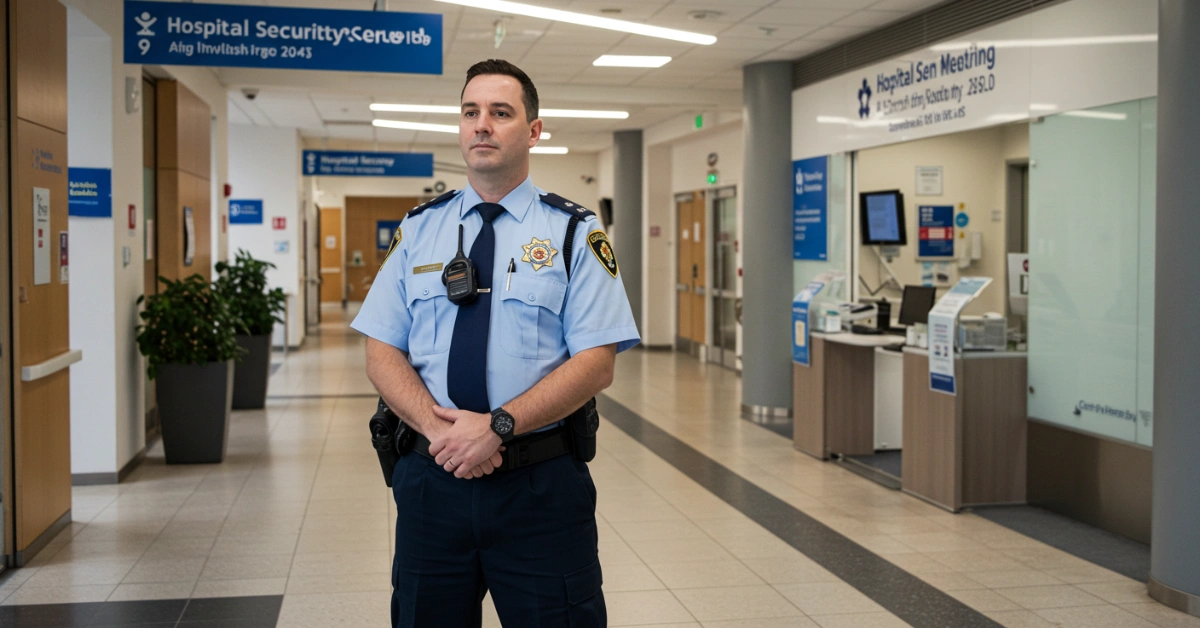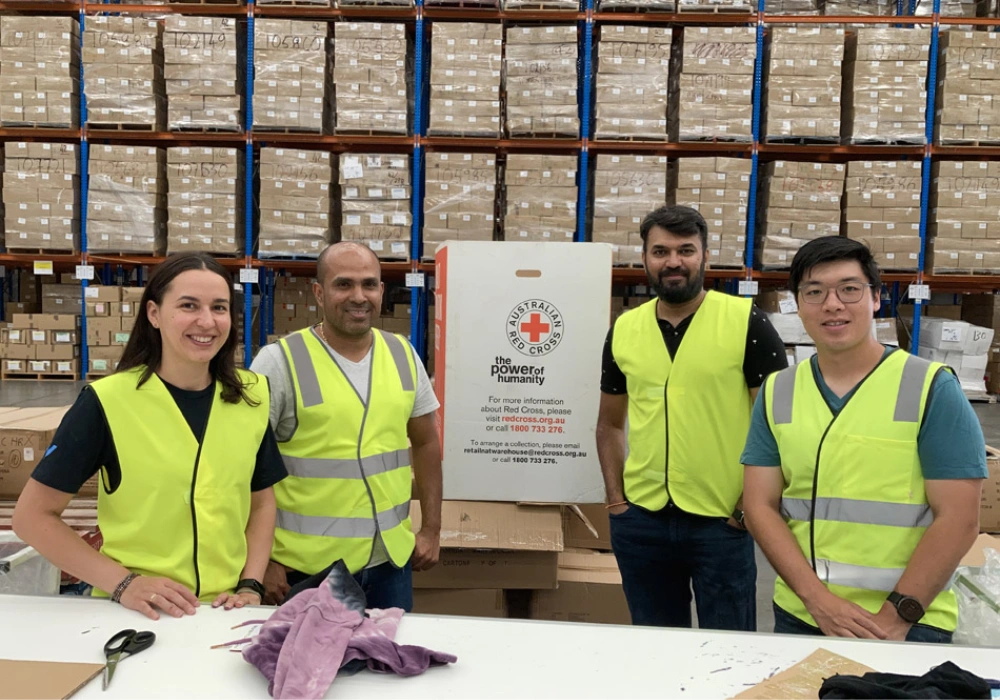Hospitals are places where many people come and go every day. There are patients, doctors, nurses, visitors, and even delivery workers. Because of this, safety is a big worry. In Perth, hospitals are being asked to do more to keep everyone safe.
1. Why Hospital Security is more important than ever?

Hospitals have valuable things, like medicine, expensive machines, and patient records. They also have people who are sick or hurt. If someone bad gets inside, it could cause big problems. That’s why guards are needed to watch over everything.
For example, in 2023, a hospital in Perth had a break-in where thieves stole thousands of dollars worth of medical supplies. This shows how important it is to have security guards watching the building all the time.
What are the current healthcare security trends in Perth?
More cameras are being installed in hospitals. Guards are getting better training to handle tough situations. Hospitals are also using smart systems to lock doors and track who comes in. These trends are making security stronger.
One new trend is the use of AI-powered cameras that can spot suspicious behavior and alert guards instantly. This technology is being tested in Perth hospitals to stop problems before they happen.
🔗 Learn more about smart security systems in Perth here.
2. What are the core responsibilities in medical environments?
Security officers are told to watch for trouble. They walk around the hospital, check doors, and talk to people. If someone is acting weird, they report it. They also help lost visitors find their way.
Some guards sit at a desk near the entrance. Others patrol the parking lot or the emergency room. Their job is to make sure everyone feels safe.
How is hospital security different from general security roles?
In a hospital, guards must be extra kind. They see sick people and worried families. They need to stay calm and not scare anyone. They also know how to act during emergencies, like fires or fights.
For example, if a patient’s family member gets upset, a hospital guard must calm them down instead of just telling them to leave. This is different from guarding a bank or store.
Why is professionalism and empathy vital for hospital security officers?
Being mean or rude could make patients feel worse. Guards are trained to smile, listen, and help. They’re not just watchers—they’re part of the hospital team.
One hospital in Perth started a program where guards learn basic first aid. Now, they can help with small injuries while waiting for nurses. This makes patients trust them more.
3. What’s driving the rising demand for healthcare services?
Perth’s population is growing. More people need doctors and hospitals. With more patients, there’s more work for guards to do.
According to the Australian Bureau of Statistics, Perth’s population grew by 10% from 2020 to 2024. This means more hospitals are being built, and more guards are needed to protect them.
Why is there an increased focus on patient and staff safety?
Stories about theft or violence in hospitals are being shared more. People want to feel safe when they go to a hospital. Guards help make that happen.
In 2022, a nurse in Perth was attacked by a patient’s angry relative. Since then, hospitals have hired more guards to protect staff.
How do regulatory requirements influence hospital security needs?
The government says hospitals must have good security. They get checked often. If they don’t follow the rules, they might get fined. That’s why they hire more guards.
For example, hospitals must have a certain number of guards per floor. They also need cameras in key areas like entrances and medication storage rooms.
4. Are hospital security jobs stable and secure?
Yes! People will always need hospitals, and hospitals will always need guards. Even when other jobs are lost, these jobs are kept.
The Australian Government’s Job Outlook website says security jobs will grow by 12% by 2030. Hospital security roles are a big part of this growth.
Can you grow your career in healthcare security?
Guards can get promoted to team leaders or trainers. Some learn new skills, like how to use cameras or alarms. This can lead to better-paying jobs.
For example, a guard who learns how to use AI-powered cameras might get a promotion to “Technology Security Specialist.” This job pays more and has more responsibility.
How can you make a difference working in a sensitive environment?
Helping a scared patient find their room, stopping a thief, or calming a fight makes a big difference. Guards are heroes who protect others.
One guard in Perth stopped a man from stealing a baby from the maternity ward. This story made the news and showed how important guards are.
5. What certifications and training are required?
In Australia, guards need a CPI (Conflict Prevention and Intervention) license. They also take classes on how to act in hospitals.
Some hospitals require guards to have a First Aid Certificate. Others want them to know how to use access control systems (like keypads or ID scanners).
Which soft skills help candidates stand out?
Being polite, patient, and a good listener matters a lot. Guards must stay focused and not get distracted.
For example, a guard who listens to a worried parent might calm them down before a problem starts. This makes the hospital safer for everyone.
Is prior experience or a background check necessary?
Some jobs require experience, but many train new workers. A clean police record is always needed.
If you’ve worked as a lifeguard or customer service rep, those skills can help. They show you can stay calm and help people.
🔗 Want to start your career? Check out security courses in Adelaide here.
6. Are there full-time and part-time hospital security jobs?
Yes! Some guards work every day. Others only come in on weekends or nights.
Full-time guards get benefits like sick leave and superannuation. Part-time guards have more free time but fewer benefits.
Do night shift and weekend roles exist in hospital security?
Hospitals never close. Guards are hired to work late at night and on public holidays. These shifts often pay more money.
For example, a guard working a midnight shift might earn $35 per hour instead of $25. This is called a “penalty rate.”
Are temporary or contract-based positions available?
If a guard is sick, someone else fills in. Short-term jobs are offered by agencies. This is good for people who want flexible hours.
Some agencies in Perth offer “on-call” jobs. Guards get a text when they’re needed. This works well for students or people with other jobs.
7. Where should you look for hospital security job listings?
Websites like Seek, Indeed, and LinkedIn list jobs. Agencies like Security Near Me also post openings.
You can also check hospital websites directly. Many post job ads under their “Careers” section.
How do you prepare a strong resume and cover letter?
List your training, licenses, and any past jobs. Make sure to explain why you want to work in a hospital.
For example:
- Resume: “CPI-certified security officer with 2 years of experience in healthcare settings.”
- Cover Letter: “I want to protect patients and staff because I care about their safety.”
What tips help you succeed in a hospital security interview?
Dress nicely. Answer questions. Show that you care about helping others.
During the interview, you might be asked:
- “How would you handle a fight in the emergency room?”
- “Why do you want to work in a hospital?”
Practice answers like:
- “I’d stay calm, call for help, and protect the patients.”
- “I want to make a difference in people’s lives during tough times.”
🔗 Find job listings here.
8. Why is hospital security a meaningful career path?
You get to help people while having a steady job. It’s exciting and full of chances to grow.
What steps should you take next to begin your journey?
Get your CPI license. Apply for jobs. Be ready to learn and work hard.



